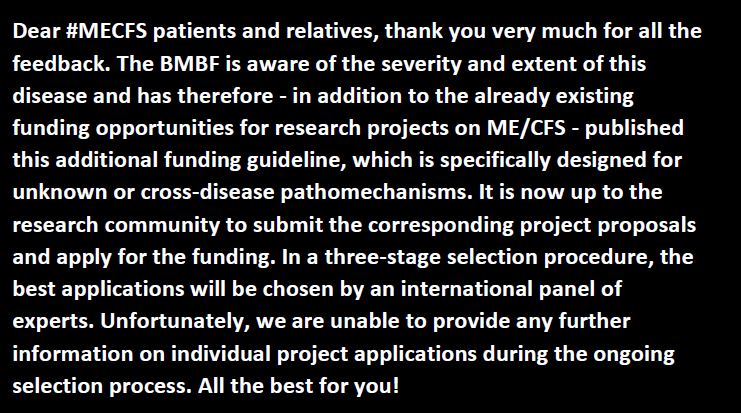ME/CFS Science Blog
Senior Member (Voting Rights)
There’s some good news from Germany.
Two federal agencies ,namely the Federal Ministry of Education and Research (BMBF) and the Federal Ministry of Health (BMG) have announced initiatives for ME/CFS. I hope I summarize these well because my German isn’t that good and it seems that the news have been announced in an unexpected and rather chaotic way (mostly on Twitter).
In this Tweet by German member of parliament for the Greens, Maria Klein-Schmeink posted a letter with info about these initiatives. In the accompanying text she writes: “Finally: things are happening #MECFS Let's hope this becomes more than a glimpse of hope.”
The letter itself mentions two new initiatives. First the the BMG will commission the Institute for Quality and Efficiency in Health Care (IQWIG) to process and publish the current state of knowledge on CFS/ME in the form of a scientific report.
Second the BMBF has announced a call for study proposals on unknown pathomechanisms of individual diseases with high disease burden but insufficient treatment options. They mention that this offers new opportunities to fund ME/CFS research.
Both agencies BMG and BMBF will also invite the main Germany patient organizations (Deutsche Gesellschaft für ME/CFS?, Fatigatio e.V., Lost Voices Foundation and MillionsMissingDeutschland) to provide info on these projects.
Two federal agencies ,namely the Federal Ministry of Education and Research (BMBF) and the Federal Ministry of Health (BMG) have announced initiatives for ME/CFS. I hope I summarize these well because my German isn’t that good and it seems that the news have been announced in an unexpected and rather chaotic way (mostly on Twitter).
In this Tweet by German member of parliament for the Greens, Maria Klein-Schmeink posted a letter with info about these initiatives. In the accompanying text she writes: “Finally: things are happening #MECFS Let's hope this becomes more than a glimpse of hope.”
The letter itself mentions two new initiatives. First the the BMG will commission the Institute for Quality and Efficiency in Health Care (IQWIG) to process and publish the current state of knowledge on CFS/ME in the form of a scientific report.
Second the BMBF has announced a call for study proposals on unknown pathomechanisms of individual diseases with high disease burden but insufficient treatment options. They mention that this offers new opportunities to fund ME/CFS research.
Both agencies BMG and BMBF will also invite the main Germany patient organizations (Deutsche Gesellschaft für ME/CFS?, Fatigatio e.V., Lost Voices Foundation and MillionsMissingDeutschland) to provide info on these projects.

